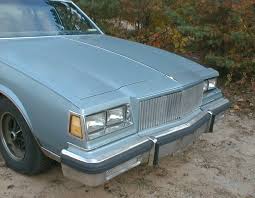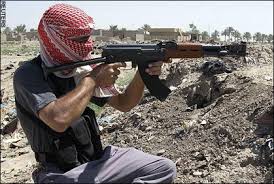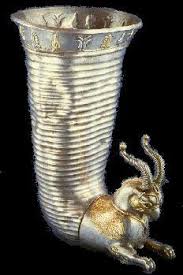Treasure Hunting Brings Sunnis, Shiites Together
by Con Chapman
BAGHDAD, Iraq. Warring Muslim factions here are getting a helping hand in their effort to bridge the gap that has divided Shiites from Sunnis since Mohammed died in the seventh century; a new version of the Peace Corps that will use recreational metal detection to build trust and friendship between the two schisms of Islam.

“It's a great family activity,” says Lowell Yoder, a resident of Brownsville, Texas who likes to comb the beaches of Padre Island on the Gulf of Mexico looking for lost coins, keys and occasionally a belt buckle or tie clasp. “Everybody goes at their own pace, from kids to grandparents.”

Yoder has come to Iraq as part of the Obama administration's plan to stabilize Iraq and bring an end to sectarian violence using amateur treasure hunting with electronic metal detectors, a hobby generally associated with loners and losers in the United States.

Metal-detecting sandals
“It's also a way to build an economy from the ground up,” says George Twohig, an official with the Agency for International Development who is leading an expedition of 100 volunteer metal detectors from across America into this war-torn land. “Lowell tells me he found almost two dollars in change on the beach last weekend,” Twohig notes. “That would go a long way in a country where the average per capita income is $4.32 for a family of six.”

Metal-detecting fever—catch it!
Yoder's first day on the job has him paired with two young men, a Shiite named Hassan Ali and a Sunni named Omar Pachachi. He gives each of them a low-cost electronic metal detector, funded by U.S. taxpayers as part of the growing price tag for the Iraqui conflict.

“This here's a perfectly adequate probe for beginners,” Yoder tells the two men, who eye each other warily as he hands each of them a Sherlock Electronic PinPoint model, suggested retail price $100, purchased in bulk for $79 per unit from Upstate Detectors in Schenectady, New York. “But not for me!” he adds with a laugh.

Lloyd's detector, by contrast to the beginner's models he has distributed, is a top-of-the-line Pro Pocket Uniprobe that retails for $299. “Last week I found a trunk key to a Buick LeSabre with this baby,” he notes proudly.
“Le sabre—A sword?” Hassan asks with interest.

“No, you goober, a car!” Yoder exclaims with mock anger, causing Hassan to flinch in fear. “Git your head out of the sand!” the Texan yells, before relenting. “I'm just joshin' you, buddy,” Yoder says with a goofy grin after he realizes his students may be somewhat jumpy with 379 deaths from sectarian violence in the last week alone.

“You got over 160,000 square miles of sand to work with,” Yoder says as the two men take off in different directions in search of buried treasure. “Try and stay out of each other's way, and maybe you'll find something.”
“Inshallah,” Hassan says.
“That's right,” Yoder replies. “God willing.”

“Git away from that Desert Storm commemorative medal—I saw it first!”
Omar is the first to get a strike, and he is quickly down on his hands and knees digging at the unknown object that caused his probe to emit the “beep” sound that signals a find. “That's it, go for it man!” Yoder shouts in encouragement. Six inches down, Omar finds a lug nut from a U.S. military jeep. “Congratulations, Big O!” Yoder shouts, causing some of the other novice treasure hunters to turn their heads as the two men exchange a somewhat tentative high-five.
“Allaha akbar!” Omar shouts, using the takbir or traditional Muslim cry of exultation meaning “God is great!” to express his joy. ”We will add this to our mubba tonight,” he says, referring to an Iraqi dish made of minced meat, nuts, raisins and spices.
Hassan looks on with jealousy as the two men celebrate. “The fool and the infidel!” he says with disgust. The red light on his probe begins to blink, and he bends down to scoop some sand away with his hand.

What Hassan discovers only a few inches down is an artifact of great historical significance; a wine cup from the Achaemenian period in the shape of a kneeling ram. Knowing its value, he tries to secrete it in the folds of his robe. Yoder, standing at least twenty-five yards away, sees Hassan's attempt to conceal his find, and springs into action.
“Hold on there, buddy boy!” he yells as he races to the Shiite. “Let's see what you got,” he says in an even voice that nonetheless carries an overtone of suspicion. As Hassan reveals the wine cup, Yoder becomes furious.
“What is the fifth commandment of the Brownsville, Texas Metal Detecting Association Code of Ethics?” he yells at Hassan.
“Uh—fill all your holes?”
“No—that's number eight. The fifth commandment is ‘I will report the discovery of all items of significant cultural or archaeological interest to a local historical society.' No ifs, ands, or buts,” Yoder snaps.

“Sorry,” Hassan says as he hands over the Persian artifact.
“Just watch yourself,” Yoder says as he puts the cup in a medium-sized Zip-Loc bag.
As Yoder walks off, Hassan curls his lip in a snarl. “You don't have to be such a jerk about it,” he mutters under his breath, but Yoder, determined to take credit for his student's find, is running to make a call on the CB radio in his pick-up and doesn't hear.

Meanwhile, Omar is about to enter territory that is off-limits, but because he can't read English he is oblivious to the warning sign posted in his path. He swings his metal detector back and forth calmly and methodically, picking up a trace signal that he pursues, the beeps growing louder as he closes in. The figure of intense concentration that he presents to a viewer is shattered when an explosion is heard and Omar is sent flying in the air, the apparent victim of a land mine.
“That's it for Mr. ‘I found a lug nut!',” Hassan says smugly. “Allahu akbar!”
Available in Kindle format on amazon.com as part of the collection “The Lighter Side of Terrorism.”
|
0
favs |
1030 views
0 comments |
1140 words
All rights reserved. |
Author's Note
The author has not attached a note to this story.
Other stories by Con Chapman
Tags
This story has no tags.